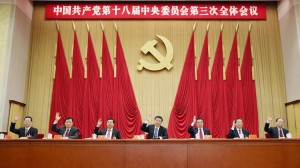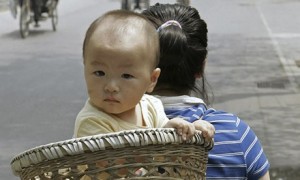
Top Chinese leaders attend the third Plenary session of the 18th CPC Central Committee in Beijing on November 12.
Photo: Xinhuanet.com
The Communist Party of China [CPC] has announced various and wide-ranging reforms promising social and economic change in years to come. These reforms, said to be part of efforts to improve human rights and judicial practices, include relaxing its one-child policy, abolishing the re-education through labour system and reducing the number of crimes for which the penalty is death.
The sixty new reforms were introduced following the meeting earlier this month of the CPC Central Committee’s third Plenum, a key decision-making body, though it may be years, if at all, until all Chinese provinces enact the changes. Details have been sparse and no timetable has been presented, forcing some speculation about how committed the party is to these new reforms. Some worry that this announcement is merely political rhetoric and that promises will be left largely undelivered, yet others hold out hope.
The People’s Republic of China, having long been criticised by rights groups for its one-child policy, has now introduced reforms intended to ease current restrictions on reproductive freedom. The one-child policy, introduced in 1979, was implemented as a means of population control within China. Although it has served its intended purpose by averting approximately 200 million births between 1979 and 2009, the policy has had many negative social consequences. Beyond its link to forced abortions, sterilisation campaigns and female infanticide, the policy has also led to a significant population imbalance with regard to both age and gender.
In addition to easing the one-child policy, China has also announced its intention to end its much-hated re-education through labour system. Although the announcement of such reforms may seem promising, “this important step will only be meaningful if the government ensures what comes after it does not institute another system of detention without trial,” warns Brad Adams of Human Rights Watch.
Established in the 1950s to silence political opponents, the camps are used today to imprison undesirables like drug addicts and prostitutes, those who complain too loudly about injustices, or people who are members of religious movements banned by the CPC. Estimated to hold as many as 190,000 people, the system of labour camps is, in principle, reserved for small crimes that do not qualify for criminal punishment. Instead, police have long used the system as an expedient tool for suppressing dissent and incarcerating anyone deemed a “threat” to public order.
Another significant reform, if enacted, is China’s promise to lessen the number of crimes subject to capital punishment. Although such figures are not released, human rights groups such as Amnesty International believe that in recent years China has executed more people than in the whole of the rest of the world.
Additional reforms include environmental crackdowns, greater economic liberalisation and the creation of a new state security commission. This commission is worrying to some as many believe it will actually serve as a vehicle for repression, making it easier for the authoritarian government to persecute critics.





 Print
Print Email
Email